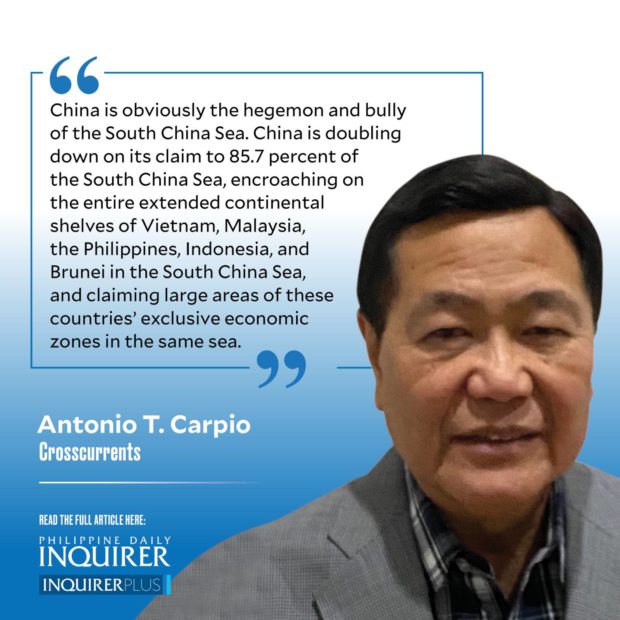Hegemon and bully of South China Sea
Last Nov. 22, 2021, while marking the 30th year of the China-Asean dialogue relationship, China’s President Xi Jinping declared that China does not seek hegemony and will not bully its smaller neighbors. Chinese diplomats routinely assure the world that China does not seek to overturn the existing international system. This is all doublespeak.
China is obviously the hegemon and bully of the South China Sea. China is doubling down on its claim to 85.7 percent of the South China Sea, encroaching on the entire extended continental shelves of Vietnam, Malaysia, the Philippines, Indonesia, and Brunei in the South China Sea, and claiming large areas of these countries’ exclusive economic zones in the same sea. This assertion to maritime dominance in the South China Sea, patently contrary to international law and the UN Convention on the Law of the Sea (Unclos), is indisputable proof of China’s hegemonic designs in the South China Sea.
Article continues after this advertisementChina is bullying its smaller neighbors in the South China Sea in full view of the world. In 2019, Chinese Coast Guard vessels forcibly prevented Vietnam from exploiting the oil and gas within its exclusive economic zone, forcing Vietnam’s foreign partners — Spanish, American, and Russian companies—to give up their concessions within Vietnam’s exclusive economic zone. In April 2020 and in October 2021, Chinese Coast Guard vessels harassed ships of Malaysian oil and gas companies drilling within Malaysia’s exclusive economic zone off the coast of Borneo.
Sometime early this year, China warned Indonesia not to conduct oil and gas surveys within Indonesia’s exclusive economic zone in the North Natuna Sea. In 2011, the Chinese Coast Guard harassed a Philippine-commissioned ship surveying in Reed Bank, within the Philippine exclusive economic zone in the West Philippine Sea. Up to now, no Philippine survey ship has returned to Reed Bank.
In February of this year, China enacted a new Coast Guard law that clearly violates in a very fundamental way the UN Charter and Unclos. China’s new law authorizes its coast guard to use armed force to implement China’s nine-dash line claim even beyond China’s territorial sea, exclusive economic zone, and extended continent shelf in the South China Sea. This violates the fundamental principle in the UN Charter and Unclos that no country can use armed force, or threat of armed force, to settle territorial or maritime disputes. China’s new coast guard law brings back the world to the turbulent era before the 1945 UN Charter, when armed force or war was a legitimate means of acquiring territory or settling disputes between states. China is obviously overturning the prevailing international system with its new coast guard law.
Article continues after this advertisementAsean states in the crosshairs of China’s hegemonic ambitions and bullying tactics should submit their remaining overlapping maritime claims to compulsory arbitration under Unclos, and invite China to join the arbitration to settle the South China Sea maritime dispute once and for all in accordance with Unclos. If China does not join the arbitration, it will be isolated. The world will support such arbitration as a peaceful means of settling the maritime dispute, as it has supported the arbitration between the Philippines and China.
Once the arbitration is concluded, the same Asean states can enter into a convention that in their exclusive economic zones and extended continental shelves in the South China Sea there is freedom of navigation as guaranteed under Unclos and customary international law. Such a convention can be open to accession by other countries, including the United States, United Kingdom, France, Japan, Australia, India, and all other coastal states of the world. If China does not join this convention, it will again be isolated.
The arbitration and the convention will be peaceful means of settling the South China Sea maritime dispute in accordance with Unclos. As to the territorial dispute involving geologic features above water at high tide in the Paracels, the Spratlys, and Scarborough Shoal, sea level rise will submerge all these features by the turn of this century and beyond. These submerged features will form part of the exclusive economic zones of the adjacent coastal states that are within 200 nautical miles from these submerged features. So while man must resolve the maritime dispute in the South China Sea, nature will resolve the territorial dispute.

















